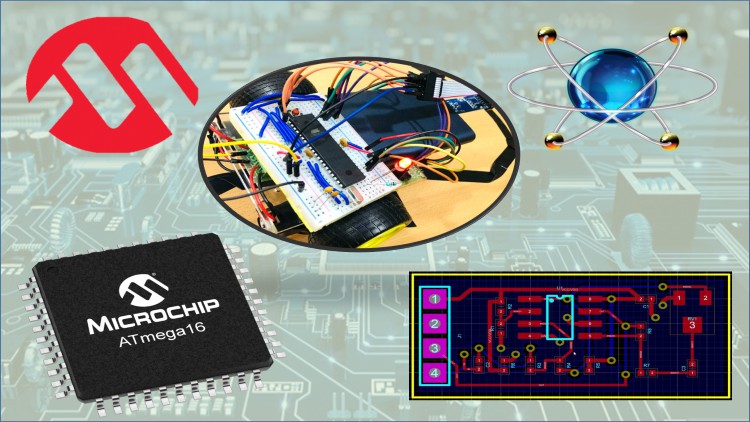
and Simulation using Proteus
What you will learn
Bare metal programming concepts of AVR series microcontrollers
Embedded System designing using Proteus simulation software.
Understanding Data Sheets
Digital Input and Output Operation
DC Motor interfacing
7-segment interfacing
LCD interfacing
ADC interfacing to read data from analog sensors
Digital sensor interfacing such as DHT11, IR sensor
Timer programming
Interrupt programming
UART Communication protocol
Why take this course?
🎓 Course Title: Bare Metal Programming of AVR Micro-Controllers and Simulation using Proteus
Course Headline: Dive into the World of AVR Microcontrollers with Bare Metal Programming and Simulation Mastery!
Unlock the Secrets of AVR Microcontrollers 🌟
Welcome to an enlightening journey into the realm of microcontroller programming! In this comprehensive online course, “Bare Metal Programming of AVR Micro-Controllers and Simulation using Proteus”, you will gain a deep understanding of how to program AVR microcontrollers from the ground up. This is not just about writing code; it’s about mastering the art of interfacing with hardware, simulating your designs before deployment, and ultimately, creating efficient and robust systems.
Course Overview 🔍
- Foundational Concepts: You’ll start by laying a strong foundation in bare metal programming, learning the essential theoretical concepts that underpin all AVR microcontroller applications.
- Practical Application: With theory at your fingertips, you’ll move on to applying these concepts in real-world scenarios, interfacing with push buttons, analog and digital sensors, LCD displays, relays, and more.
Hands-On Learning Experience 🛠️
- Simulation with Proteus: Before you touch the actual hardware, you’ll use the Proteus simulation software to design your systems, analyze their functioning, and verify that everything works as expected. This hands-on approach allows you to troubleshoot and refine your designs in a virtual environment, ensuring confidence when deploying to real-world applications.
Real-World Integration 🌏
- Interface with Various Components: You’ll learn how to interface AVR microcontrollers with a multitude of components, understanding the intricacies of each and how they fit into your larger system design.
- Project-Based Approach: Small projects throughout the course will solidify your knowledge and provide practical experience that you can apply to larger systems. These projects are designed to cover various aspects of microcontroller programming, from simple blinking LEDs to complex communication protocols.
Advanced Features & Protocols 🚀
- Communication Protocols: Implement UART, SPI, and I2C communication protocols to send and receive data with other microcontrollers, expanding the capabilities of your systems.
- Real-Time Operations: Learn to implement timers in real-case scenarios, ensuring precise timing for your applications.
- Interrupt Management: Understand how to use interrupts to improve control applications and handle events more efficiently.
- Modular Programming: Apply modular programming concepts to create reusable, maintainable, and scalable code structures.
What You Will Learn 📚
- Theoretical Foundations: Gain a thorough understanding of the AVR microcontroller architecture and instruction set.
- Hardware Interfacing: Learn how to interface with various hardware components, including sensors, actuators, displays, and more.
- Simulation Techniques: Master the use of Proteus for simulation, reducing the time and cost associated with hardware prototyping.
- Practical Skills: Develop practical skills in writing, uploading, and debugging firmware using Integrated Development Environments (IDEs) like ATMEL Studio and others.
- Communication Protocols: Implement UART, SPI, and I2C to facilitate communication between microcontrollers.
- Real-Time Operations: Learn to implement real-time operations using timers for precise timing applications.
- Interrupt Handling: Understand and use interrupts for better control application response and efficiency.
- Modular Programming: Embrace modular programming to write clean, reusable code that’s easy to maintain and scale.
Why Take This Course? 🤔
This course is designed to take you from a beginner to an expert in AVR microcontroller programming. Whether you’re a hobbyist, student, or professional, the skills you’ll acquire here are valuable for any project that requires efficient and reliable embedded system design. With hands-on projects and real-world applications, you’ll be well-equipped to tackle complex problems and create innovative solutions in the field of electronics.
Enroll now and embark on a journey to become an AVR microcontroller programming expert with the practical skills and theoretical knowledge to make your mark in the world of embedded systems! 💻✨